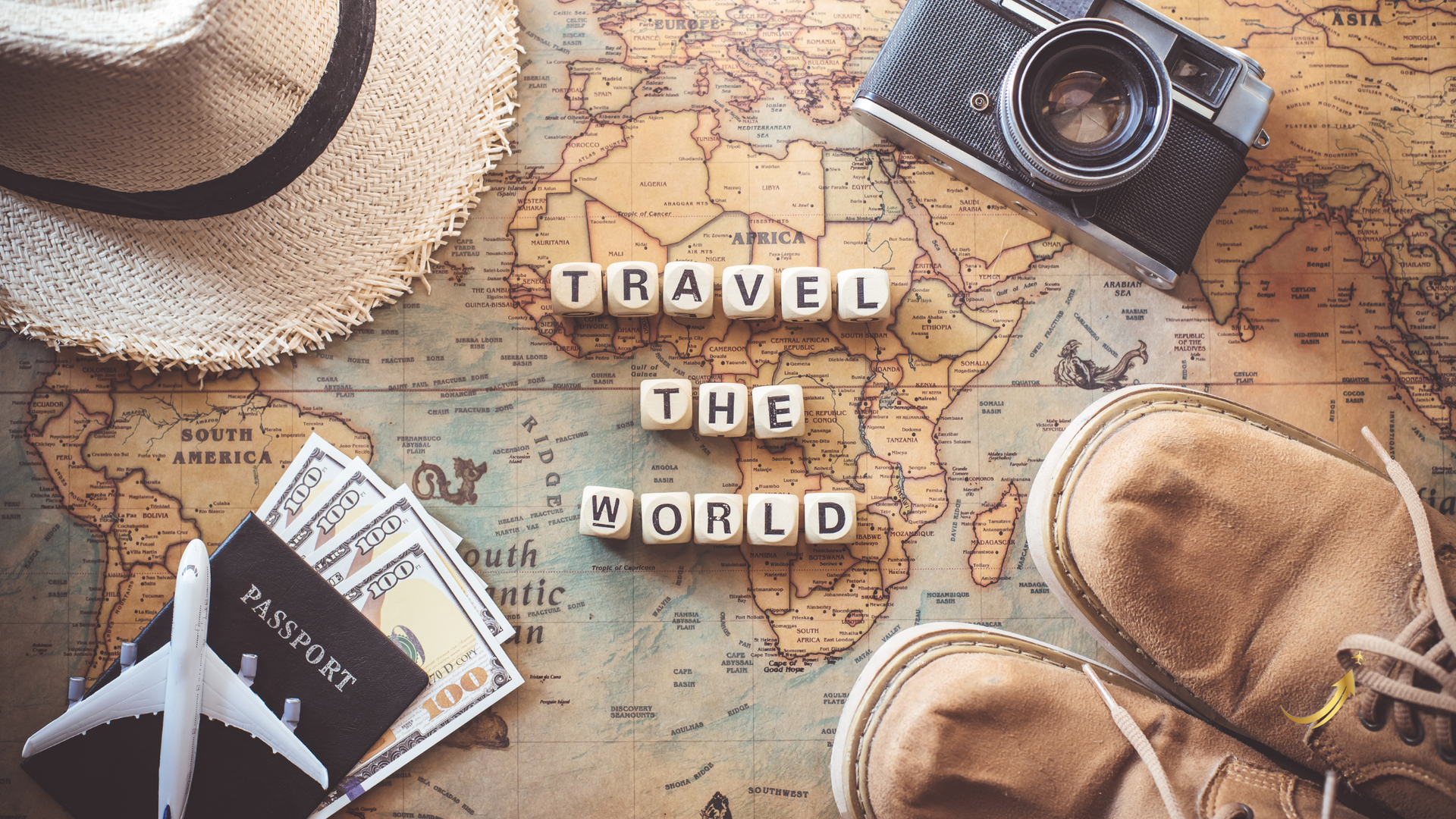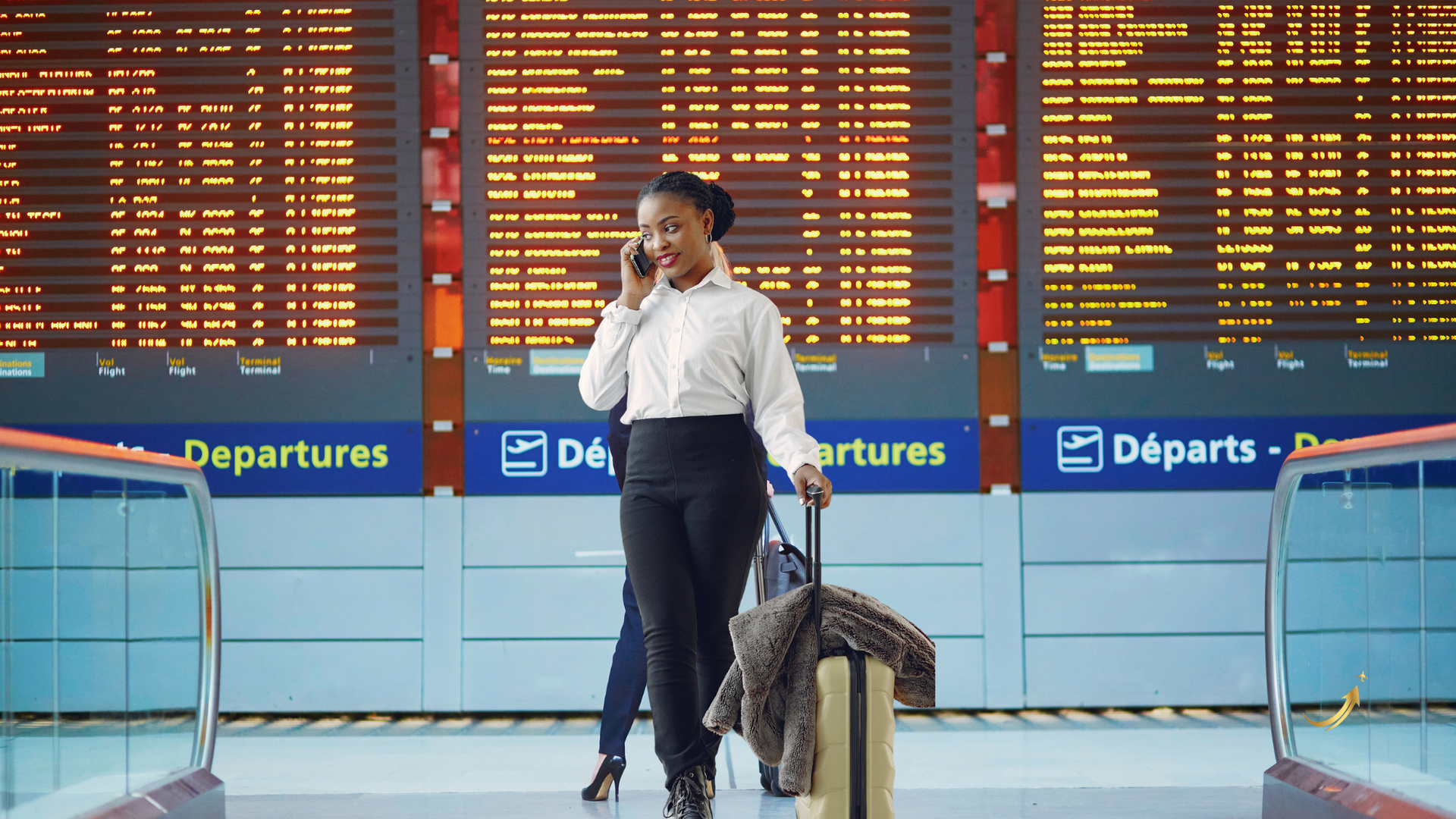6 Reasons Why You Can Benefit from A Vaccine Passport
Cynthia Amin • May 4, 2021
These days, anyone looking to leave the country, or even leave their state, has many things to consider - from available flights to pre-or-post-travel restrictions to testing requirements. As the prospect of a rebounding travel industry is increasingly beginning to look like an eventual reality and the vaccine continues to roll out in the U.S. and around the world, a new question arises and that is - what will be required to travel in the future?
Experts have been looking at the concept of a “vaccine passport,” or at least some sort of digital way to store health information that would allow travelers to easily show that they have been immunized when entering countries or even visiting other states.
However, as widespread vaccination and herd immunity is still a while off, and requirements for entering countries differ from country to country, travel will not be “easy” until at least 2022.
Travelers must also realize that being vaccinated does not necessarily mean that when you reach your destination all restrictions in terms of eating out and wearing and not wearing your mask will disappear. There will still be different rules for different countries and states for a long time.
It is especially important that airlines, tourism boards and travel advisors educate their clients and travelers of their options and what to expect when they reach their destination.
While the vaccine continues to roll out to the public, and fully implemented vaccine passports are still on the horizon, there are somethings that travel lovers need to know when considering their travel plans.
1. What is a vaccine passport?
A vaccine passport allows travelers to prove they have been immunized against COVID-19 or any other contagious virus or infection. The record could be on paper or it could be digital.
One of the biggest problems with using proof of immunology to cross borders is that vaccines could vary from country to country — and that’s even more true with brand new vaccines like COVID-19.
Everything depends on the vaccines being effective in eliminating or reducing the transmission of the virus. There may be differences in effectiveness in one vaccine over another. Some countries may still require COVID-19 tests before travel or may require a test on arrival. There will also probably be some evolving strategies that different countries will use.
There are several candidates for COVID-19 vaccine passports like The CommonPass, or the International Air Transport Association's IATA travel pass
that will show information about a user’s test results, eventual proof of inoculation, and a link to an electronic copy of their passport. Security firm International SOS has also developed a similar app and it calls itself the OKpass.
The CommonPass
is an app that lets you collect, manage, and share your health information on a private level. It is also a global trust network because it gives the ability for a government in one country to trust the test results from an entity in another country.
2. Is the concept of a vaccine passport new?
The concept of a vaccine passport is not new. Vaccine passports have been used for a long time and have been required in some form to participate in public life since the 1800s.
An example of this is the yellow fever vaccine. Several countries in Africa require proof that travelers have received a yellow fever vaccination. This information is written inside an international certificate of vaccination or prophylaxis (or a “yellow card”).
The original concept was a digital yellow card. If the information is provided digitally there is no way that the document can be counterfeited or tampered with because the information will be tied into the network.
The CommonPass
did a trial with Cathay Pacific Airways and United Airlines and has partnered with JetBlue, Lufthansa, Swiss International Air Lines, and Virgin Atlantic, as well as the government of Aruba.
3. How is your information stored?
Privacy concerns are paramount and each vaccine passport that has been proposed works differently.
The CommonPass, which is connected to more than 300 health systems, allows users to log into their health provider’s site within the app. The app then tells users what tests (or eventually immunization records) they need and generates a QR code that the traveler can show to authorities.
It’s good to note that no new technology has been invented, this is solid architecture that has been around for years.
The IATA travel pass will allow authorized labs and test centers to securely share test and vaccination certificates with passengers. These test or vaccination certificates will be stored on your phone and the app will generate a QR code that you can share relevant information with authorities at border crossings.
4. Will a vaccine passport eliminate the need for masks and other common safety measures?
While we all hope to get back to life as normal, it’s going to take some time. Stocking up on comfortable travel masks and hand sanitizer in the meantime is the way to go.
Regardless of if you are home or abroad and until we have clear information that the vaccines are eliminating that risk of transmission, we should still maintain the rules of social distancing and mask wearing and hand hygiene.
5. Will vaccine passports boost travel?
We are not sure if having a vaccine passport will boost travel. Maybe in the long run, but not necessarily in the immediate future.
Israel, for example, has said it will issue a “green passport” to those who are vaccinated, which allows them to visit restaurants or skip potential quarantine rules, but every country will likely have different rules.
Getting a vaccine and a vaccine passport “is not a get out of jail free card.” A big part of travel is knowing what we can do when we get to your destination. There are a lot of places that you may feel safe traveling to, but if you can’t do what you want in a destination that will hold a lot of people back from going.
Having the vaccine and even a vaccine passport will help, but the spontaneity of travel is not going to come back for a long time.
6. Where are COVID-19 vaccine passports being used?
Several countries and destinations have started issuing vaccine passports to their citizens or requiring them to cross the border.
Iceland, Denmark, and Israel, for example, have said they will give out health passports to their own vaccinated citizens in an effort to get back to normal life. Other countries, like Estonia, Poland, and Romania, have lifted quarantine requirements for vaccinated travelers from certain permitted countries.
Still other destinations, like the Seychelles and Georgia, are welcoming fully vaccinated travelers from any nation (including Americans). And two U.S. states -- Vermont and New Hampshire -- have even waived quarantine requirements for vaccinated travelers. Keep in mind the list is changing every day.
Starting this spring, several cruise lines will launch their ships from foreign ports on cruises that will be open to North American passengers.
Cruising is still banned in U.S. waters, due to the CDC's conditional sailing order. But beginning in June, about 15 ships will cruise from ports in Europe and the Caribbean. This information is changing all the time, so please contact Colesville Travel
if you are interested in cruising and we will provide updated information.
Virgin Voyages will be setting sail soon, as well as Royal Caribbean. Contact Colesville Travel if you are interested in getting a quote on any of these cruise ships.
Virgin Voyages will be setting sail soon, as well as Royal Caribbean. Contact Colesville Travel if you are interested in getting a quote on any of these cruise ships.
One good thing to remember is that most cruiselines will only book fully vaccinated persons and the crew will be fully vaccinated. So please let us know when you are ready to cruise, and updated information will be provided to you upon request.
Final Thoughts
The use of a vaccine passport is a controversial term. But it’s good to keep in mind that a vaccine passport is a very simple concept and is something that you will have to show to prove that you've been fully vaccinated. This vaccine passport will allow you to attend particular high-risk events, whether it might be a movie theater, board an airplane, attend a concert, or something like that.
It is worth noting that vaccine passports have been implemented successfully in some countries around the world and has expedited the return to a much more normal life. I think this is a very small price to pay to get us back to some type of normalcy.
What are your thoughts on a vaccine passport?
If you are ready to start the planning process, contact us at 301-989-1654
or send an email to cindy@colesvilletravel.com
You can also visit our website https://www.colesvilletravel.com
Until then, stay inspired.
Cindy
Blog

Are you passionate about exploring the world and love sharing adventures with your friends? Travel is most meaningful when it’s shared with the people you enjoy most. If you love exploring the world and bringing friends together, there’s a well-designed, effortless way to do just that. With expert support from Colesville Travel, every detail is thoughtfully arranged whether you prefer a fully escorted experience or a relaxed journey at your own pace. Through our Adventure Ambassador Program , you can enjoy beautifully curated group travel while receiving exclusive benefits along the way. If you’re ready to travel well with your circle, we invite you to explore the Adventure Ambassador experience. 1. Become the Trusted Curator for Your Travel Circle Many people dream of traveling but are hesitant because of the details involved such as selecting the right destination, choosing accommodations, and coordinating experiences. By bringing your circle together with the support of Colesville Travel, you offer them a beautifully curated trip where every segment of your travel is thoughtfully arranged, making group travel feel effortless, refined, and truly enjoyable. 2. Take the Stress Out of Group Travel Bringing a group together doesn’t mean managing every detail yourself. Colesville Travel takes care of all the arrangements in advance, so you don’t have to worry about coordinating the details. Colesville Travel handles all trip arrangements, ensuring a seamless experience so your group can travel with ease, comfort, and confidence from start to finish. Everything will be organized for maximum fun and minimal hassle. 3. Inspire Your Friends to Explore Traveling together invites your friends to enjoy experiences they may not have chosen on their own - beautifully curated and effortlessly enjoyed. From private wine tastings in Italy and refined beach retreats in the Caribbean to unforgettable safaris in Africa, immersive food experiences in Bangkok, or exclusive museum visits in France, every detail is thoughtfully arranged to reflect the destination at its very best. With the support of the Adventure Ambassador Program and the expertise of Colesville Travel, you and your guests simply arrive, relax, and savor the journey. 4. Enjoy Meaningful Rewards While Traveling Well One of the most rewarding aspects of traveling with your circle is the added benefits that come with it. Through the Adventure Ambassador Program , thoughtfully curated group travel can include exclusive savings, preferred amenities, and in some cases, complimentary travel opportunities. With Colesville Travel handling every detail, your passion for exploring the world is enhanced with meaningful rewards, without compromising comfort, quality, or experience. 5. Create Lifelong Memories and Connections Travel is about more than where you go, it’s about how it makes you feel and who you are sharing it with. Traveling with your friends allows you to create moments that linger long after the trip ends: elegant dinners with unforgettable views, enriching guided experiences, and shared discoveries in beautiful destinations. With every trip carefully arranged, these trips naturally become cherished memories and lasting connections. Final Thoughts Travel is at its most rewarding when it’s shared. If there’s a destination you’ve been dreaming about, this is your opportunity to experience it alongside friends in a way that feels effortless, refined, and thoughtfully curated. With expert planning and personalized support from Colesville Travel, you and your circle can enjoy the journey from the very first idea to the final memory, beautifully arranged, and entirely your own. Contact Colesville Travel at 301-989-1654 to learn more or click Adventure Ambassador Program for more information. Until then, stay inspired Cindy #TravelWithFriends #GroupTravelMadeEasy #MatureWomenTravel #TravelLeadership #AdventureAmbassador #SharedAdventures #GirlsGetaway #TravelCommunity #LuxuryTravelWithFriends #TravelTogether

Travel is changing and, in many ways, it’s getting better. As someone who’s been planning trips for decades and traveling the world firsthand, I can tell you this with confidence that 2026 is shaping up to be a fantastic year to travel, especially for travelers who value comfort, culture, and meaningful experiences over rushing from place to place. If you’re thinking about traveling in 2026, whether it’s a bucket-list destination, a long-awaited celebration, or simply time to enjoy the world again I hope this guide will help you understand what’s coming, where to go, and how to prepare so your trip feels exciting instead of overwhelming. What’s Trending in Travel for 2026 One of the biggest shifts I’m seeing is that people are traveling with more intention. Travelers aren’t just asking where they want to go but they are asking how they want to feel while they’re there. From my research here is what’s stands out for 2026: Fewer Trips, Better Experiences Instead of packing in multiple destinations, travelers are slowing down. Travelers are staying longer, making deeper connections, and are taking the time to actually enjoy the destination. These items are becoming the priority. Comfort Matters More Than Ever Premium economy, business class upgrades, smaller group tours, private transfers, and well-located hotels are no longer “extras” but are part of traveling well. Meaningful & Cultural Travel People want experiences that feel personal: food tours, local guides, heritage travel, music, art, wine, and history and not just photo stops. Small Group & Hosted Travel Travelers love knowing someone else has handled the details. Small group journeys, escorted trips, and curated itineraries are especially popular heading into 2026. Where to Go in 2026 While the classics will always be popular, 2026 is the perfect year to explore destinations that offer rich culture without the chaos. Here are a few standouts travelers are gravitating toward: Europe—Beyond the Obvious Think Portugal, Southern Italy, France beyond Paris, river cruising, and train-based itineraries. These allow you to see more without constantly unpacking. Africa & Heritage Travel Countries like Ghana, South Africa, and Morocco continue to grow in popularity, especially for travelers seeking history, connection, and powerful experiences. Alaska & Expedition-Style Cruising Alaska remains a favorite, especially for travelers who want nature, wildlife, and comfort all in one trip without flying overseas. Caribbean with Purpose Instead of just beach time, travelers are choosing islands that offer culture, food, rum tastings, sailing, and local experiences alongside relaxation. How to Prepare for Travel in 2026 (Start Now) Here’s something I say often and it’s more important than ever: The best trips are planned early. Waiting until the last minute usually means fewer choices and higher prices. Travelers who start preparing for their trip early, enjoy better flight options, better hotels, and far less stress. Here’s what I recommend doing now: Check Your Passport Many countries require passports to be valid at least six months beyond your return date. This is one of the most common and preventable travel issues. Start to Think About Timing Popular destinations and cruises are already filling up for 2026. Flexibility helps, but early planning helps even more. Decide How You Want to Travel Do you want independent travel, small group experiences, or a fully escorted trip? Knowing how you want to travel makes planning smoother and more enjoyable. Working with a Professional Travel today involves more moving parts than it used to. Having someone who understands the destination, the logistics, and your personal travel style makes all the difference. Why 2026 Is a Year to Travel Well If there’s one thing experience has taught me, it’s this: travel should enrich your life, not exhaust you. 2026 is the perfect opportunity to travel smarter, to choose destinations that inspire you, choose experiences that matter, and travel at a pace that allows you to truly enjoy the journey. Whether you’re dreaming about Europe, Africa, cruising, or something completely new, now is the time to start the conversation. Final Thoughts Are you ready to start planning? If you’re thinking about traveling in 2026, I’d love to help you shape a trip that fits you, I will take into consideration your comfort level, interests, and travel goals. The earlier we begin, the better your options will be. Travel is an investment in yourself. Let’s make it a great one. Contact Cindy at Colesville Travel today at 301-989-1654 or email cindy@colesvilletravel.com and let us help you start planning for 2026. Stay inspired, Cindy #ColesvilleTravel #TravelwithCindy #Travel2026 #TravelTrends2026 #FutureTravel #TravelPlanning #TravelSmart #IntentionalTravel #MeaningfulTravel #LuxuryTravel #SlowTravel #SoftAdventure

More and more women—especially women of color—are choosing journeys that feed the soul as much as they satisfy their desire to travel. Cultural heritage travel has quickly become one of the most powerful ways to explore the world, offering travelers a space to connect with history, identity, community, and personal growth. As travelers look beyond traditional sightseeing, they’re discovering destinations that speak to their roots, broaden their perspectives, and create moments of deep reflection. From the castles of Ghana to the historic streets of Paris, these journeys inspire a sense of belonging and an even greater appreciation for the richness of global culture. Why Cultural Heritage Travel Matters For many women, cultural travel offers: A deeper understanding of identity A sense of connection to shared history The chance to honor ancestors and explore personal narratives Opportunities for discovery, healing, and empowerment These experiences aren’t about looking into the past, they are about growing forward. And with the world becoming more accessible than ever, there's no better time than now to take a journey that feels truly meaningful. Destinations That Inspire Connection and Growth Ghana: A Homecoming Experience Ghana stands at the forefront of heritage travel. From the Door of No Return at Cape Coast Castle to the vibrant traditions of Accra and Kumasi, visitors often describe their time here as life changing. It’s a place where the past speaks powerfully and the present welcomes with open arms. Travelers can explore art, music, food, and a sense of cultural pride woven into everyday life. Paris: Celebrating Black Art, History & Global Influence Paris is more than romance; it’s a city shaped by global voices. From Josephine Baker’s legacy to the powerful Black history exhibits at the Musée d’Orsay and the activism rooted in Montmartre, Paris invites women to discover their place in a much bigger story. It’s a destination where culture, creativity, and empowerment meet together. London: A Tapestry of Global Stories London is one of the most diverse cities in the world, rich with museums, archives, and neighborhoods that highlight the contributions of people of color. From the Black Cultural Archives in Brixton to landmarks tied to the Windrush generation, the city offers a layered journey through history, migration, and cultural evolution. The Caribbean: A Celebration of Identity & Tradition Each Caribbean Island tells its own powerful story. Whether exploring the African-Caribbean heritage of Barbados, the Maroon communities of Jamaica, or the historic plantations and cultural revival in Antigua, travelers find a blend of joy, resilience, music, and ancestral connection across the region. It’s a warm, welcoming place to experience culture in motion. 10 Countries Ideal for Cultural & Heritage Journeys These destinations offer rich experiences for travelers, especially women of color looking to explore identity, history, and culture: Ghana – West African heritage, storytelling, and history. Senegal – Goree Island, arts, and traditional culture. South Africa – Apartheid history, Indigenous cultures, and cuisine. Morocco – North African traditions, architecture, and design. France (Paris + beyond) – Black history, arts, global culture. United Kingdom (London) – Migration history and multicultural neighborhoods. Barbados – Caribbean identity, music, and heritage sites. Jamaica – Maroon culture, music, and ancestral connections. Brazil – Afro-Brazilian history in Salvador, Bahia. Colombia – Vibrant Afro-Colombian communities and coastal traditions. These countries offer travelers the chance to experience heritage, artistry, and cultural pride while also enjoying food, nature, fashion, and modern city life. A Journey That Stays with You Cultural heritage travel isn’t just a trend, it’s a movement. Women are choosing trips that allow them to reflect, reconnect, and return home transformed. Whether standing on sacred ground, walking through historic neighborhoods, or sharing stories with local communities, these journeys leave a lasting imprint. If you’re ready to curate a heritage-centered trip for yourself or a group, I’m here to guide you every step of the way—bringing decades of experience, global connections, and heartfelt understanding of what these moments mean. Final Thoughts Cultural heritage travel is more than visiting new places, it’s about discovering yourself through the stories, history, and traditions of the world. Discover the transformative power of cultural heritage travel for women, where every trip offers meaningful experiences, connection, and personal growth. From exploring history in Ghana, Paris, and London to immersing yourself in the rich cultures of the Caribbean, your journey can be unforgettable and inspiring. Contact Cindy at Colesville Travel today at 301-989-1654 or email cindy@colesvilletravel.com and let us help you plan a cultural heritage vacation that speaks to you. Stay inspired, Cindy #CulturalHeritageTravel #WomenOfColorTravel #MeaningfulTravel #VisitGhana #TravelParis #ExploreLondon #CaribbeanCulture #WomenWhoTravel #BlackWomenTravel #TravelWithCindy #ColesvilleTravel #SeeTheWorldDifferently

If you’re already daydreaming about where to wander in 2026, you’re not alone. Travel is booming again, and the best trips, the kind that feel effortless, immersive, and unforgettable are the ones you start planning early. With over three decades exploring the world and designing journeys for thousands of travelers, I can tell you: 2026 is shaping up to be a fantastic year to get back out there. Below are the destinations rising to the top of my list. These places are full of culture, flavor, adventure, and the kind of beauty that stays with you long after you return home. 1. Chile: From Santiago’s Wine Scene to the Atacama’s Otherworldly Landscapes If you want a destination that blends culture, culinary delights, and soft adventure, Chile is calling your name. Santiago’s food and wine scene is on fire. When I think of Santiago, I think of boutique vineyards, rooftop tastings, and world-class restaurants. Then it’s time to head north to the Atacama Desert, where you’ll wander salt flats, stargaze under the clearest skies on Earth, and soak in natural hot springs. Why Go in 2026: The country is investing in new luxury eco-lodges and upgraded flight routes, making it easier than ever to explore. 2. Ghana: Culture, Heritage & Connection Ghana continues to capture the hearts of travelers looking for meaning and heritage in their journeys. Explore Accra’s lively markets, indulge in coastal cuisine, and walk the historic Cape Coast sites that tell powerful stories. From local artisans to music, fashion, and festivals, Ghana is overflowing with life and warmth. Why Go in 2026: With rising interest in African heritage travel, getting your trip on the books early ensures curated experiences with the best guides, hotels, and cultural experts. 3. Tuscany, Italy: Slow Living Meets Culinary Heaven Tuscany never goes out of style, but in 2026 travelers are craving a deeper, slower way of exploring. Picture yourself in a charming villa just minutes from a historic town. You will be close enough to enjoy outdoor cafés and dinners in lively piazzas, but peaceful enough to enjoy rolling-hill views and a glass of local Chianti. Why Go in 2026: New boutique properties are opening near Siena, Montepulciano, and San Gimignano, offering the perfect blend of countryside relaxation and city access. 4. Barbados: Warm Breezes & Elevated Luxury Barbados is stepping into the spotlight with revitalized resorts, new direct flights, and a growing collection of private experiences including sunset cruises, rum blending workshops, island safaris, and some of the Caribbean’s best dining. Why Go in 2026: Whether you want adults-only, family-friendly, or upscale pampering, the island’s hospitality scene is undergoing an exciting refresh. 5. Alaska by Sea: A New Take on America’s Final Frontier With new itineraries launching for 2026 which include small-ship and adults-only options, Alaska is attracting travelers who want a mix of rugged nature and modern comfort. Think of glacier-carving views, wildlife encounters, and pampering onboard experiences. Why Go in 2026: 2026 will be one of the best years to secure prime cabins and bonus amenities, especially for limited-sailing brands. 6. Paris: Art, Fashion & Festivals All Year Long Paris continues to reinvent itself while holding tight to its timeless charm. With new museum exhibitions, riverfront parks, and fresh culinary trends, it’s the perfect place for travelers who want to mix culture with everyday delights like markets, cafés, strolls, and late-evening jazz. Why Go in 2026: With major renovations completed across the city, 2026 will offer smoother access, less construction, and a revived cultural calendar. 7. Portugal's Coastline: Sun, Seafood & Soulful Towns From Cascais to the Algarve, Portugal’s coast offers sun-drenched days, cliff-side views, and ocean-to-table cuisine. Whether you want surfing, wine tasting, beach towns, or quiet luxury, Portugal’s charm is irresistible. Why Go in 2026: The secret is officially out! Planning early means locking in the top seaside stays before they sell out. FINAL THOUGHTS Ready to Plan Your 2026 Getaway? The world is opening its arms and the smartest travelers are planning ahead. Whether you’re dreaming of wine country, vibrant cities, warm beaches, or meaningful cultural journeys, now is the perfect time to start building a trip filled with intention, joy, and memory-making moments. When you're ready, I’m here to help you shape a beautiful, seamless journey from start to finish. Contact Cindy at Colesville Travel today at 301-989-1654 or email us at cindy@colesvilletravel.com and let us help you plan your next vacation anywhere in the world.

As someone who has guided clients through every kind of travel scenario, I wanted to share an up‑to‑date, clear picture of what’s going on, how it might affect your upcoming trips, and most importantly, what savvy travelers can do to stay ahead of disruptions. Why the Cuts Are Happening Due to the ongoing U.S. government shutdown, the FAA has announced a reduction of up to 10% of flights at about 40 “high‑volume” U.S. airports as a safety measure, citing rising fatigue and staffing shortfalls among air‑traffic controllers. Although the full list of affected airports is still evolving, many major hubs like New York, Washington, Chicago, Atlanta, and Los Angeles are included. In short: fewer flights, more delays, and increased uncertainty are now part of the travel landscape. What This Means for Travelers More potential for cancellations and delays: Even if your flight isn’t listed among those being cut, ripple effects are real. Airlines are already canceling and rescheduling to comply with guidelines. Several airports see longer security or check‑in lines due to staffing pressures in both FAA and TSA. Types of flights most likely to be impacted: United Airlines has indicated that their cuts will focus on domestic and regional flights, rather than long‑haul international routes. According to travel analysts, routes that are less full like smaller markets, regional connections, flights with limited frequency are most at risk. Which airlines and airports are most affected: The 40 airports targeted are among the busiest in the U.S.: hubs like Atlanta Hartsfield‑Jackson International Airport (ATL), Chicago O’Hare International Airport (ORD), Los Angeles International Airport (LAX), and D.C.‑area airports, among others. Major carriers are affected: Airlines such as United, Delta Air Lines, and American Airlines have publicly addressed the issue and indicated they are adjusting, but the risk is higher for flights out of major hubs and flights that depend on less frequent service. Practical Advice & Smart Travel Moves Here’s how I advise my traveling clients during this situation: Stay alert: Download your airline’s app, enable push notifications, and check flight status often. The schedule is shifting. Act fast if cancelled: If notified of a cancellation, you’re essentially in a race to rebook. The sooner you act, the better your chances to avoid major disruption. Know your rights: If your flight is cancelled or significantly changed (e.g., delayed several hours), you’re eligible for a full refund, even if the ticket was non‑refundable. Consider alternate routing: If your trip is time‑sensitive, choose nonstop flights when possible; smaller connections may be vulnerable. Also consider booking a backup ticket or alternate carrier if you must arrive by a certain time. Manage check‑in and arriving at airport: Even with fewer flights, staffing shortages at security and check‑in lines mean arriving early remains wise, especially with the holiday season coming closer. Premium clients/tailored service: For higher‑needs travelers (mature women traveling internationally, etc.), consider booking with extra buffer time, or choosing flights on carriers/hubs that indicate they’ll be less impacted (e.g., major international routes). Why This Matters for Travel Advisors & Your Clients I hope this blog accomplishes the following: Helps clients to understand the “behind‑the‑scenes” issues (like FAA staffing) that affect travel reliability. Help craft itineraries with contingency plans and protective booking choices. Pre‑empt client worries: by proactively preparing clients, reducing stress and building confidence. Reinforce that travel advisor’s role goes beyond simply booking. They can advise on safe, comfortable travel in a shifting environment. Final Thoughts The skies are still open, but the operational picture has shifted. The FAA’s decision to reduce flights by up to 10% in major U.S. airports is a disruption trigger. Travelers should expect possible cancellations, delays, and tighter connections, not because of weather or standard delays, but because of a systemic staffing contingency. By staying informed, planning with cushion, and leveraging flexibility, you can still travel smoothly. As always, building in extra time, picking more robust routes, and staying proactive will pay off. If you would like more information, contact Cindy at Colesville Travel today at 301-989-1654 or email us at cindy@colesvilletravel.com, and let us help you plan a smooth, stress-free trip no matter what’s happening in the world. #TravelTips #AirTravel #FlightDelays #FAAFlightCuts #AirportTips #TravelSmart #FlightCancellations #TravelPlanning #AirlineUpdates #StressFreeTravel

When you’ve been in the travel industry for more than 30 years, you learn that sometimes global events like weather strikes, or even government actions can ripple through the travel world in unexpected ways. One topic making headlines lately is the U.S. government shutdown and how it might affect travelers. Whether you’re planning a weekend getaway, a family vacation, or an international journey, here’s what you need to know — and how to stay prepared so your travel plans stay on track. What Happens During a Government Shutdown A government shutdown occurs when Congress fails to approve funding for federal agencies. When this happens, nonessential federal operations temporarily close, and many employees are furloughed (sent home without pay). If the shutdown is prolonged, a rise in "sick calls" can lead to longer waiting times and flight delays, as seen in past shutdowns. However, essential services continue including airport security (TSA), air traffic control (FAA), and Customs and Border Protection. So yes, planes will still fly, but the experience can feel different when thousands of federal workers are working without pay. How Travelers Can Be Affected Here are the main ways a government shutdown could have an impact on your travel experience: 1. Airport Delays and Longer Security Lines TSA agents and air traffic controllers are considered essential. They are working but without pay this often leads to staffing shortages and slower processing times. Tip: Arrive at the airport earlier than usual — at least 2–3 hours for domestic and 3–4 for international flights especially for peak travel times. Make sure you download the airline's app for real-time updates. 2. Passport and Visa Delays Most passport offices remain open as long as the facility’s building is funded, but if it’s located inside a federal building that closes, applications could be delayed. Tip: Apply for passports and renewals early ideally at least 12–16 weeks before travel. Administrative backlogs can build quickly even after the government reopens. 3. National Parks and Monuments May Close During previous shutdowns, many national parks stayed “technically open” but with limited services. For example, visitor centers may be closed, trash uncollected, and restricted access. The lack of staff and maintenance could create safety and sanitation issues. Tip: Always check the official park website before you go and have a Plan B for sightseeing or outdoor activities. 4. Travel Confidence and Cancellations A prolonged shutdown can create uncertainty and anxiety, which may lead to cancellations or travel hesitancy. The good news? Most major airlines and travel suppliers continue operations normally. Tip: Work with a trusted travel advisor (like us!) who can help you navigate any sudden changes if you need to rebook your travel. How to Protect Your Trip During the shutdown there are ways to reduce stress and avoid disruption: Purchase travel insurance that includes delay or cancellation coverage. Book flexible fares and refundable hotel rates. Keep copies of travel documents (passport, itinerary, confirmations). Enroll in TSA PreCheck or Global Entry to save time at security checkpoints. Work with a professional travel advisor who monitors travel alerts and can advocate on your behalf if schedules change. A Message from an Experienced Travel Advisor At Colesville Travel, we’ve guided travelers through everything, from hurricanes to airline strikes to global shutdowns. Our goal is always to keep you informed, protected, and stress-free no matter what’s happening in the world. If you have upcoming travel plans and you’re concerned about how a potential shutdown could affect your itinerary, reach out to us. We’ll review your plans, check supplier updates, and make sure you have the right protection in place. Final Thoughts A government shutdown doesn’t have to stop your travel plans. With a little preparation, flexible bookings, and the guidance of an experienced travel advisor, you can stay ahead of any disruptions. Plan smart, stay informed, and enjoy your journey with confidence. Your travel should be about making memories, not worrying about what’s happening behind the scenes. Ready to travel worry-free? Contact Colesville Travel today at 301-989-1654 or email us at cindy@colesvilletravel.com, and let us help you plan a smooth, stress-free trip no matter what’s happening in the world. Because when it comes to travel, being prepared is always the best plan. Stay inspired, Cindy #TravelTips #GovernmentShutdown #TravelAdvisory #TravelSmart #AirportLife #TSA #StressFreeTravel #TravelUpdates #GlobalEvents

Practical and Soulful Strategies for Mindful, Meaningful Travel. In an era when travel is often filtered through social media, it’s easy to focus more on the highlight reel than the experience itself. But the richest moments in travel don’t usually happen when you're taking the perfect photo but happen when you step away from the camera and immerse yourself in the world around you. As a travel advisor with more than 30 years of global experience, I’ve seen how the most transformative journeys are the ones where travelers slow down, engage deeply, and fully show up. Here's how you can take your next trip “beyond the selfie” and into the heart of your destination. 1. The Power of Slow Travel Slow travel is about quality over quantity. You don’t have to cover a dozen cities to have a meaningful trip. In fact, the more places you try to cram in, the less you truly experience any of them. Remember, you don’t have to see everything. In fact, trying to “do it all” often leaves you feeling exhausted and disconnected. Slow travel invites you to go deeper, not faster. It’s about: Choosing quality over quantity Spending time in fewer places Allowing space for spontaneity Take time to sit in a café and people-watch, get lost on a side street, or spend a full afternoon exploring a local market. Slow travel isn’t rushed; it’s rooted. And the memories last longer because you are present enough to notice them. That’s where the magic happens. 2. Engage All Five Senses To be truly present, you need more than your eyes. Lead with your senses. Listen to the languages and rhythms of daily life. Smell the scent of spices or morning bread baking. Taste something new—even if it scares you a little. Touch handmade textiles or the cool stone of ancient walls. Feel the sun, the breeze, embrace every moment. Engage your senses as soon as you arrive in your destination, it will make your experience more vivid, memorable and unforgettable. 3. Connect with People, Not Just Places Every destination is brought to life by its people. It’s not just the landmarks that you visit, it’s the conversations, the laughter, and the local people that you meet. Here are some ways to build connection: Learn a few phrases in the local language Ask your guide about their favorite neighborhood Take a cooking class or dine in a local home Support family-run businesses and artisans Cultural exchange isn’t a one-way street. Being open creates space for shared learning and meaningful impact. 4. Journal the Experience, Not Just the Events You don't need to be a writer to keep a travel journal. You just need to be curious and willing to reflect. Ask yourself questions like: What surprised me about this place? What caused me to stop and think about what I just saw? What do I want to bring home besides souvenirs? How about a new a mindset? Journaling helps you slow down, make sense of your experiences, and capture memories that photos alone can't capture. 5. Unplug with Intention Being present sometimes means stepping away from technology. Social media can wait—but the moment you're in won't last forever. Try this: Schedule one “unplugged” day or afternoon during your trip Leave your phone in your bag during meals or museum visits Take as many photos as you like, but don’t live through the lens You may be surprised by what you notice when you’re not constantly taking pictures. 6. Travel With Intention When you travel with intention, you’re not putting on a show or collecting content, you’re entering a conversation with the world. Every destination has something to teach you, if you're willing to listen. Rather than treating travel like a checklist or a social media post, approach it as a two-way exchange. Learn to connect with the land, its people, and yourself. Let your journey be more than a photo op. Let it be a time to listen, to feel, to evolve. When you return home, the most treasured souvenirs won’t be the souvenirs you purchased or your social media posts. It will be the changes that you made within yourself. Final Thoughts Ready to travel deeper? At Colesville Travel, we design immersive journeys for curious, culturally aware travelers who want more than just the postcard experience. Whether you're dreaming of traveling to Africa, South America, Europe or any other continent, Colesville Travel can curate a trip that feeds your mind, body and soul, and not just your camera roll. Let Colesville Travel plan your next meaningful escape. Contact us at 301-989-1654 or email us at cindy@colesvilletravel.com . You can also visit our website www.ColesvilleTravel.com CONTACT INFORMATION Cynthia Amin Colesville Travel Phone: 301-989-1654 Email: cindy@colesvilletravel.com Website: https://www.colesvilletravel.com #colesvilletravel #travelwithcindy #MindfulTravel #TravelWithIntention #SoulfulJourneys #SlowTravelMovement #MeaningfulTravel #AuthenticTravelExperiences #WomenWhoTravelWell #TravelDeeperLiveLighter #UnpluggedAdventures #BeyondTheSelfie #PresenceOverPictures #TransformationalTravel

In a world where travel has become more accessible than ever, many experienced travelers are craving more than just beautiful views and passport stamps. They want to travel with intention—to experience cultures deeply, engage meaningfully, and return home changed. This is the heart of purposeful travel, and it's becoming the gold standard for mature explorers who seek more than a vacation. What Is Purposeful Travel? Purposeful travel is about making meaningful connections—with people, places, history, and even yourself. It's an immersive style of travel where the goal isn’t just to relax, but to grow, learn, and give back. Whether it's standing at the Door of No Return in Ghana, listening to stories of resilience in South Africa, or sharing a meal with locals in a small Italian village, purposeful travel allows you to walk away with new perspectives and a fuller heart. Why Mature Travelers Are Leading This Movement Mature, well-traveled individuals are at the forefront of this shift because they understand that experiences matter more than souvenirs. They’re not looking to check boxes—they’re looking to transform the journey into a personal legacy. This kind of travel is ideal for: • Those celebrating milestone birthdays or retirements • Women’s groups seeking personal enrichment • Solo travelers craving connection without compromise • Couples wanting to deepen their bond through shared adventure What Does Purposeful Travel Look Like? Here are just a few examples from real journeys I curate: Ghana: Trace the powerful history of the African diaspora, visit local artisans, and experience vibrant culture through dance, storytelling, and cuisine. Join us on our next journey to Ghana on February 12 – 21, 2026. Click Here South Africa & Zimbabwe: Witness the breathtaking beauty of nature while exploring themes of social justice, healing, and unity. Join us December 27 – January 6 for our tour of South Africa and Safari and then on to Zimbabwe, January 6 – 9, 2026. Click Here Italy: Cook with locals in Tuscany, explore ancient ruins, and engage with community-focused wineries that preserve tradition and environment. The Benefits of Traveling with Intention Connection: You’ll form real bonds with people, not just take their pictures. Reflection: Travel becomes a mirror—helping you understand your place in the world. Transformation: Many travelers report these journeys as life-changing—because they are. FINAL THOUGHTS Ready to Travel with Purpose? If you're craving more from your next adventure, more depth, more joy, more connection—purposeful travel may be exactly what your soul is seeking. Join me on a journey where your curiosity leads, your heart expands, and your travel memories become your personal legacy. Looking to connect with like-minded explorers? Join the movement of mature, passionate travelers who crave more than just vacations. Explore upcoming purposeful group trips to Ghana, South Africa, and beyond by visiting our website https://www.colesvilletravel.com or contact me at cindy@colesvilletravel.com to start planning your intentional journey today. Cindy Looking to connect with like-minded explorers? Join the movement of mature, passionate travelers who crave more than just vacations. #PurposefulTravel #TransformationalTravel #MatureTravelers #CulturalImmersion #TravelWithMeaning #SoulfulJourneys #WomensTravelGroup #GroupTravelExperiences #ExploreWithHeart #TravelConnections #AfricaTravel #GhanaTour2026 #SouthAfricaAdventure #MeaningfulMoments #LegacyTravel #TravelForConnection #TravelBeyondTheSurface #TravelOver50 #CuratedExperiences #ColesvilleTravel


